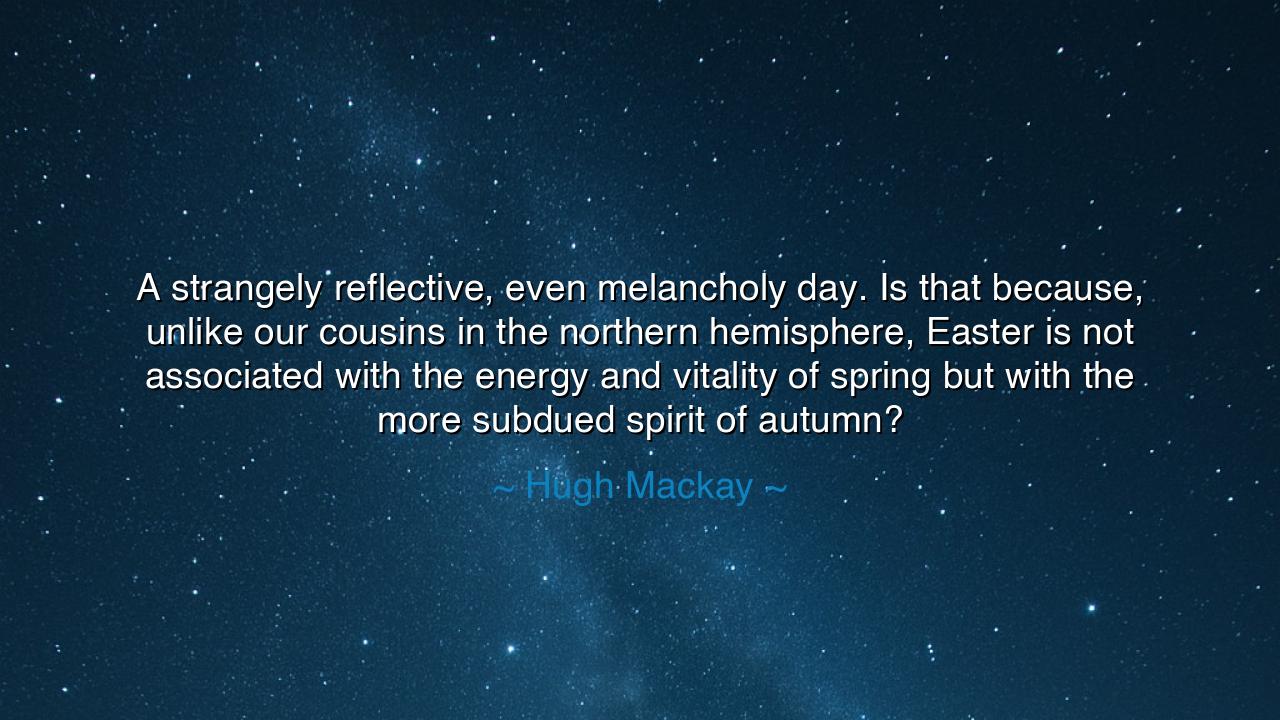
A strangely reflective, even melancholy day. Is that because
A strangely reflective, even melancholy day. Is that because, unlike our cousins in the northern hemisphere, Easter is not associated with the energy and vitality of spring but with the more subdued spirit of autumn?






In this reflection by Hugh Mackay, we are invited to ponder the subtle dance between season and spirit, between the outer world of nature and the inner realm of human feeling. He observes that, for those in the southern hemisphere, Easter arrives not amid the blossoming joy of spring, but within the quiet descent of autumn—a time of fading light, falling leaves, and reflection. His question is not merely about weather or geography, but about the way the cycles of nature mirror the moods of the soul. In spring, life bursts forth with renewal; in autumn, it withdraws into contemplation. Thus, Mackay speaks to a truth older than any religion: that the world around us whispers its lessons to the heart, shaping how we experience joy, sorrow, and faith itself.
To the ancients, the changing of the seasons was not just a natural phenomenon but a sacred rhythm—a reminder that life and death, gain and loss, birth and decay are bound together in eternal harmony. Mackay’s melancholy Easter, cloaked in the colors of autumn, reflects this timeless wisdom. For in the season of falling leaves, one learns the beauty of impermanence. The flowers of spring teach us how to begin, but the leaves of autumn teach us how to let go. What greater lesson could there be for those who celebrate the death and resurrection of Christ than this — that renewal is born not only in bursting life, but also in graceful surrender?
When we think of Easter, we imagine rebirth: the stone rolled away, the dawn of hope, the triumph of life over death. Yet in the lands where autumn reigns during Easter, this triumph takes on a quieter tone. There is no explosion of color or scent of new blossoms — instead, there is the hush of falling leaves, the golden dusk of reflection. Mackay’s insight reveals how the human spirit adapts to its surroundings, finding meaning even in contrast. While the northern world celebrates resurrection with vitality, the southern may honor it with reverence — not as an outward festival, but as an inward awakening. This is not a lesser joy, but a deeper one, rooted in stillness rather than in song.
History offers us many mirrors of this truth. Consider the life of Vincent van Gogh, whose art burned bright against the backdrop of his despair. His sunflowers bloomed from a heart acquainted with darkness. Like Easter in autumn, his genius emerged not from abundance but from struggle. Or recall Abraham Lincoln, who guided his nation through the long night of civil war, finding within sorrow the seed of renewal. Both men embodied the paradox Mackay hints at — that melancholy and hope, decay and rebirth, are not enemies but eternal companions in the soul’s journey.
There is, too, something profoundly Australian in Mackay’s words. For those who dwell under the southern skies, far from the cultural roots of Europe, the world’s festivals often feel inverted — Christmas in summer, Easter in autumn. Yet this inversion becomes a metaphor for all of human life: we must each learn to find meaning when the world seems turned upside down. The wise do not cling to borrowed symbols but read the book of nature as it unfolds before them. Thus, in the soft dying of the year, the southern heart discovers its own form of resurrection — quiet, tender, inward, and true.
The melancholy Mackay describes is not despair but awareness — a recognition that every joy is shadowed by transience. Autumn’s gentle sorrow reminds us that to live deeply is to feel deeply, to see the fading beauty of things and still call them good. It is the sadness of a sunset that refuses to be bitter, the sigh of gratitude for what must pass. This mood, far from opposing the spirit of Easter, completes it. For resurrection without death, spring without autumn, joy without reflection — these would be hollow victories, without wisdom to anchor them.
The lesson Mackay offers, if we listen with the ear of the soul, is to honor the season we are given. Whether your life stands in the bloom of spring or the hush of autumn, there is sacred meaning to be found. Rebirth does not always roar like thunder; sometimes it arrives like a whisper in the wind. So, when your days feel subdued, when reflection outweighs vitality, do not curse the season. Instead, learn from it. For even in melancholy, there is renewal — the kind that deepens rather than dazzles, that steadies rather than stirs. And thus, the heart grows wise.
Let us remember, then, that life’s sacred balance depends upon both energies — the spring that calls us to rise and the autumn that teaches us to rest. In the quiet of the fading year, the soul gathers its strength for another dawn. And when the next spring comes, we will rise again — not merely renewed, but transformed by the gentle wisdom of the fall.






AAdministratorAdministrator
Welcome, honored guests. Please leave a comment, we will respond soon